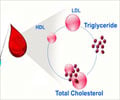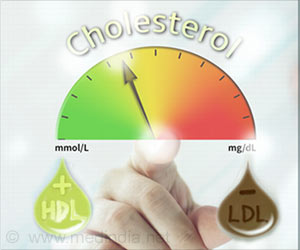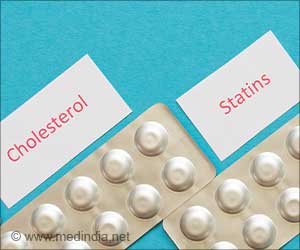High cholesterol is responsible for about 3.9 million worldwide deaths. Half of these deaths happen in East, South and Southeast Asia, revealed study.

‘Non-HDL cholesterol for UK women ranked 18th highest in the world and 16th highest in Europe in 1980. In 2018, it ranked 130th highest in the world and 34th highest in Europe.’





The research used data from 102.6 million individuals and examined cholesterol levels in 200 countries, across a 39-year time period, from 1980 to 2018. The work, which was funded by the Wellcome Trust and the British Heart Foundation, revealed that high cholesterol is responsible for about 3.9 million worldwide deaths. Half of these deaths happen in East, South and Southeast Asia.
Cholesterol is a waxy substance found in the blood. The body needs cholesterol to build healthy cells, but too much can lead to a build-up in the blood vessels. Cholesterol comes in different types. High-density lipoprotein (HDL) 'good' cholesterol, which should be 1mmol/L or above, is thought to have a protective effect against heart attack and stroke, by mopping up excess 'bad' cholesterol.
Non-HDL 'bad' cholesterol, which should be as low as possible, around 2mmol/L, can block blood supply and lead to heart attacks and strokes. This type of cholesterol is usually raised by diets high in saturated and trans fats, which is found in many processed foods, instead of healthier unsaturated fats. It can be lowered effectively through the use of statins.
The results of the new study revealed total and non-HDL cholesterol levels have fallen sharply in high income nations, particularly those in North-western Europe, North America and Australasia, while rising in low- and middle-income nations, particularly in East and Southeast Asia. China, which had some of the lowest levels of non-HDL cholesterol in 1980, had one of the largest rates of increase in non-HDL over the 39 year study period.
Advertisement
Countries with the highest levels of non-HDL cholesterol, which is a marker of cardiovascular risk, changed from those in Western Europe such as Belgium, Finland, Greenland, Iceland, Norway, Sweden, Switzerland and Malta in 1980 to those in Asia and Pacific, such as Tokelau, Malaysia, the Philippines and Thailand.
Advertisement
Professor Sir Nilesh Samani, Medical Director at the British Heart Foundation said: "It's encouraging to see the reduction in levels of non-HDL, or 'bad', cholesterol in the UK since 1980. Public health initiatives about the risks of a diet high in saturated fat, and wider treatment with statins in those with high levels will have made a big contribution. The result is undoubtedly fewer heart attacks and strokes. However, we mustn't be complacent or be misled by this change. High numbers of people still have undiagnosed or uncontrolled levels of non-HDL cholesterol putting them at greater risk of heart and circulatory diseases. We strongly encourage people, especially those over 40, to have their cholesterol checked. It's important for those diagnosed with high non-HDL cholesterol to follow their doctor's advice for lowering it."
The research, which produced cholesterol comparisons for all 200 countries, also found that:
• Non-HDL cholesterol for UK men ranked 18th highest in the world and 16th highest in Europe in 1980. In 2018, it ranked 106th highest in the world and 35th highest in Europe.
• Non-HDL cholesterol for US women ranked 50th highest in the world in 1980. In 2018, it ranked 127th highest in the world.
• Non-HDL cholesterol for US men ranked 42th highest in the world in 1980. In 2018, it ranked 108th highest in the world.
• Non-HDL cholesterol for Chinese women ranked 152th highest in the world in 1980. In 2018, it ranked 110th highest in the world.
• Non-HDL cholesterol for Chinese men ranked 153th highest in the world in 1980. In 2018, it ranked 99th highest in the world.
• Non-HDL cholesterol for Indian women ranked 139th highest in the world in 1980. In 2018, it ranked 140th highest in the world.
• Non-HDL cholesterol for Indian men ranked 128th highest in the world in 1980. In 2018, it ranked 128th highest in the world.
• Non-HDL cholesterol for Australian women ranked 32th highest in the world in 1980. In 2018, it ranked 146th highest in the world.
• Non-HDL cholesterol for Australian men ranked 31th highest in the world in 1980. In 2018, it ranked 116th highest in the world.
• Non-HDL cholesterol for Canadian women ranked 37th highest in the world in 1980. In 2018, it ranked 147th highest in the world.
• Non-HDL cholesterol for Canadian men ranked 32nd highest in the world in 1980. In 2018, it ranked 123rd highest in the world.
• Non-HDL cholesterol for German women ranked 23rd highest in the world and 19th highest in Europe in 1980. In 2018, it ranked 100th highest in the world and 27th highest in Europe.
• Non-HDL cholesterol for German men ranked 24th highest in the world and 21st highest in Europe in 1980. In 2018, it ranked 83rd highest in the world and 31th highest in Europe.
• Non-HDL cholesterol for French women ranked 27th highest in the world and 22nd highest in Europe in 1980. In 2018, it ranked 42nd highest in the world and 4th highest in Europe.
• Non-HDL cholesterol for French men ranked 15th highest in the world and 14th highest in Europe in 1980. In 2018, it ranked 26th highest in the world and 11th highest in Europe.
Source-Eurekalert














